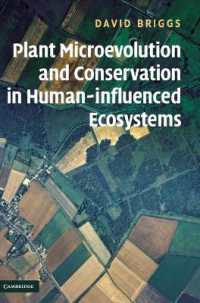- ホーム
- > 洋書
- > 英文書
- > Literary Criticism
基本説明
Examines travel writing's contribution to the development of a Russian national culture from roughly 1700 to 1850, as Russia struggled to define itself against Western Europe.
Full Description
Breaking Ground examines travel writing's contribution to the development of a Russian national culture from roughly 1700 to 1850, as Russia struggled to define itself against Western Europe. Russian examples of literary travel writing began with imitative descriptions of grand tours abroad, but progressive familiarity with the West and with its literary forms gradually enabled writers to find other ways of describing the experiences of Russians en route. Blending foreign and native cultural influences, writers responded to the pressures of the age—to Catherine II, Napoleon, and Nicholas I, for example—both by turning "inward" to focus on domestic touring and by rewriting their relationship to the West. This book tracks the evolution of literary travel writing in this period of its unprecedented popularity and demonstrates how the expression of national identity, the discovery of a national culture, and conceptions of place—both Russian and Western European-were among its primary achievements. These elements also constitute travel writing's chief legacy to prose fiction, "breaking ground" for the later masterpieces of writers such as Turgenev, Dostoevsky, and Tolstoy. For literary scholars, historians, and other educated readers with interests in Russian culture, travel writing, comparative literature, and national identity.
Contents
Acknowledgments
Note on Transliteration and Citations
Introduction
1. Fonvizin and the Russian Tour of Western Europe (1689-1789)
2. Radishchev and Domestic Description (1767-97)
3. Karamzin and the Internal Account (1791-1812)
4. Returning to Europe (1812-25)
5. Reimagining Foreign and Domestic Space (1810-50)
6. In Conclusion: On Firm Ground
Notes
Works Cited
Index of Names and Texts








